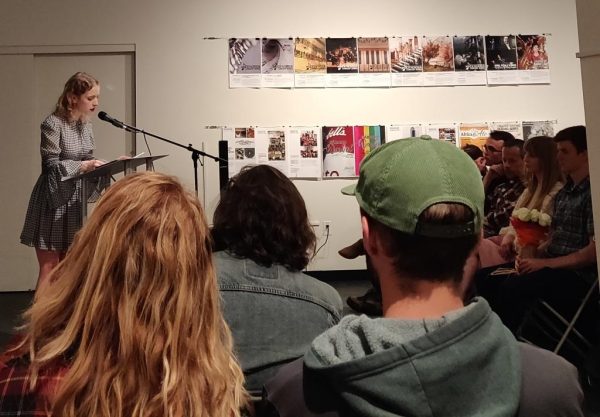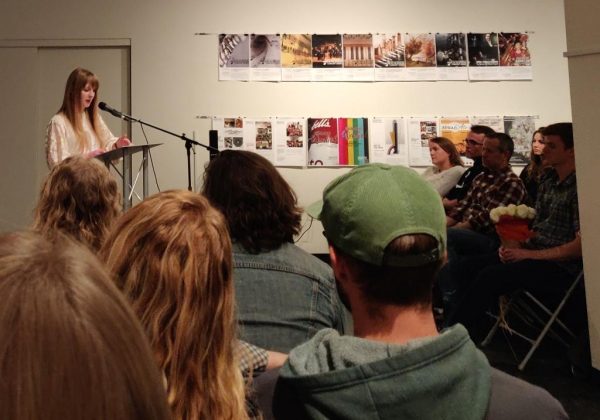Typically when we post about events in the Creative Writing Reading Series, we write from the perspective of being in the audience and listening. This time, we decided to “flip the script” and let you see things from the perspective of the writers who were reading.
Emma Hyche
MFA Creative Writing

A short description of her thesis: My thesis, Picnic in the Abattoir, is concerned with the development and negotiation of feminine self formation in the midst of a myriad of antagonistic forces, like violence against women, the depiction of violence in media, films and the culture they create, etc.
An excerpt from what Emma read that night, the opening of her piece titled “The Lead Detective.”
If you held me underwater, or if I held myself.
*
I started to think what traces I litter—detritus of presence in the absence of a body. I expel multitudes.
*
I started to picture my Lead Detective, his hat and nose.
*
I left my skin cells under pink blades in the shower and clogging the drain. I left my foot or its ghost in the mud by the shore of the lake. The toes or their ghosts curve like pale shells in the dirt.
*
If you stacked me in the closet, or behind a wall, or if I stacked myself.
*
I left some blood somewhere and it smells like the old pennies when it dries.
*
The Lead Detective creases his brow.
*
I left a thumbprint in soap film, the trace it couldn’t get clean.
*
If you cyanided the water supply, or it I poisoned myself. Saliva drying on the toothbrush.
*
The Lead Detective snaps the latex and relishes the sting. This is going to take all night.
Other thoughts: The MFA reading was a wonderful chance to recognize the work I’ve done, and celebrate cumulatively with my advisors, my family, and my MFA peers. I’ve had several opportunities to read from the manuscript previously, so my preparation process mostly focused on selecting poems that could be approachable to a wide audience and served as representative examples of the manuscript as a whole. My inspiration for the project comes from the collision of my two primary interests over the past two years: poetry and film, particularly horror film. I was dissatisfied at the scope and tenor of work dealing with horror films, so I decided to tackle the common ground where the two genres could meet myself. I see a lot of similarities between poetry and horror as subgenres within broader (more profitable and more popular) genres (namely literature and film as wholes). Within the next year, I’m hoping to return to this manuscript, incorporate the feedback from my thesis committee, and submit it widely for publication. I’d also like to continue to interest in creative nonfiction piqued by certain poems in the manuscript and transition into writing lyric essays on similar subject matter.
Katherine Indermaur
MFA in Creative Writing, Poetry
Managing Editor, Center for Literary Publishing

A short description of her thesis: “Girl Descends Asunder” is an original poetry collection interested in origins, how to live with and move forward from what we are given, and—when that fails—how to rewrite the stories of those origins.
A short excerpt from what she read last week, the beginning of the poem “After: Many Songs.”
In light, the girl saw the crow aloft in flight but carrying a shadow-color atop his wings,
a black slit of sky yawning mid-morning toward blue. This dark memory of whole slipped through, apart.
In light, the girl’s nostrils flared, aflame with air. Her lungs lit up, wrung
to the cusp of dry. In light, there were sudden pines on which the crow would perch.
He folded up his shadow wings, cleared
his throat again and again. From the valley floor the girl saw bright his sudden nest—
a circle knot, a crust of pine worked thin. In the girl’s rasped throat, a flicker.
What was the process of writing your thesis like? I first began to write the poems that would go into my thesis manuscript a year and a half ago, in the last graduate poetry workshop class of my degree. In working closely with my advisor and thesis committee members, and occasionally sending poems to friends, I was able to narrow down a theme and what poems I wanted to include in the manuscript. At one point I wrote thirty poems I thought would go in the manuscript but, in the end, not a single one made it in its original form. I did cannibalize some lines from those poems and eventually include them, though, so it was still worth it—but lots of work! I also did a lot of research about mirrors, their history, their uses, and how they appear in pop culture and literature throughout history.
How did you decide what to write about? I began writing “Facing the Mirror,” a 35-page poem that takes up the majority of my manuscript, last year when I had a dream of an art exhibit featuring paintings that were painted atop mirrors. As I viewed them, there were spaces where I saw my reflection, and spaces where it was painting I saw. When I brought the beginnings of that poem to workshop, my peers and my advisor told me to keep going. When I did, that eventually turned into the main part of my manuscript.
How did you decide what to share at the reading? Because so many of my poems are very long (most are over 5 pages), it was hard to pick what parts of which to read. I tried to pick sections that I thought would be most interesting to hear aloud, and I practiced a lot.
Had you read your work to an audience before? Yes, I read some poems from this manuscript at a reading last year in Laramie, Wyoming, and I’ve done a few readings before as well. I would like to read more often, though!
What was that experience like (the MFA reading)? I was really nervous at first, but as I looked around the room, I realized everyone was there to support me and wished me well. All my anxiety melted away and I had a great time!
Do you have plans for your thesis beyond meeting your graduation requirement? After defending my thesis in May, I hope to revise it and begin submitting it for publication as a book of poems. Individual poems and pieces of the manuscript have already been accepted for publication by literary journals like Ghost Proposal, Oxidant | Engine, and COAST|noCOAST.
What other projects are you currently working on or hoping to start working on? I’m also working on another manuscript that interweaves love poems with poems concerned with climate change and environmental destruction.
What are your plans for after graduation? I’ll be moving to Salt Lake City to join my fiancé and dog, who already live there. I hope to continue my career in the nonprofit sector or in editing, publishing, or communications.
Join us tonight for the final event in this semester’s Creative Writing Reading Series!

Devin Murphy grew up near Buffalo, New York in a family with Dutch roots. He holds a B.A./M.A. from St. Bonaventure University, an M.F.A. from Colorado State University, a PhD from the University of Nebraska—Lincoln, and is an assistant professor of creative writing at Bradley University. He has worked various jobs in national parks around the country and once had a three-year stint at sea that led him to more than fifty countries on all seven continents. His fiction has appeared in more than 60 literary journals and anthologies, including The Missouri Review, Glimmer Train, The Chicago Tribune, New Stories from the Midwest, and Confrontation.